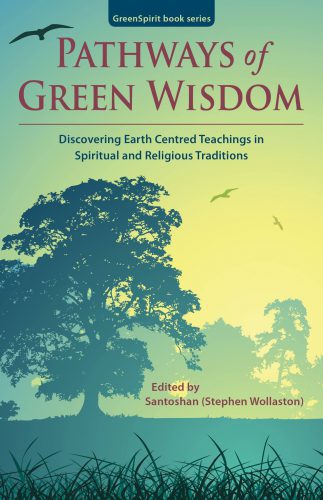October 14th, 2020
By Santoshan (Stephen Wollaston)
Guest Writer for Wake Up World
For all Muslims the whole of Earth, which has been entrusted to humans by God to protect and preserve, is seen as a divine gift and blessing from God. Earth itself is looked upon as an expression of beauty. Beauty being an attribute of God. And ‘the shaper of beauty’ or ‘the designer of forms’ (Al-Musawwir) is one of God’s ninety-nine beautiful names in Islam. In the book Sufi Light, Ahmad Javid points out that, “The universe reflects the stunning beauty of its supreme Creator and displays His qualities constantly in every moment … Not only [do] all things come from God but in a way they also manifest God”.
[pro_ad_display_adzone id=”110028″]
In an essay on Islam, humankind and Nature, Mohammad Aslam Parvaiz informs us that, “As we learn about nature, it becomes abundantly clear that the entirety of nature is an integrated whole”. The Qur’an itself mentions both environmental and cosmic harmony created by God, how the sun and moon, plants and trees all submit to God’s design and balance. (55:5-9). Because of such mystical insights it can be seen that the whole Earth offers profound and constant opportunities for Muslims to be aware of God’s presence. A famous passage in the Qur’an in fact tells us that God is closer than our jugular vein (50:16).
Environmentalism
The Qur’an calls for all Muslims to “walk humbly on the earth” and promote “peace” to “the foolish” (25:63). From an Islamic perspective, because God has created all things and species, all forms of life ultimately need to be cherished and preserved. The Qur’anic saying advocating “no compulsion in religion” (2:256) reminds Islam’s followers and others that the Muslim tradition, in its purest form, is about unity, harmony, peace-making actions and nonviolence, which applies not only to humans but to the world at large. The idea of unity (tawhid) in particular, which is traditionally seen to be about God’s oneness, Muslim environmentalists also consider to be about all-inclusiveness, Richard C Foltz informs us.
Verses from the Qur’an also invite Muslims to “remember God’s blessings” (7:74), to “not corrupt the earth after it has been set right” (7:55), and to “not seek to spread corruption in the land” (28:77). Although some may interpret these passages to be only concerned with blessings God has bestowed on humans and human justice and nonviolence, it is accepted amongst green conscious Muslims that they can be expanded to include wider issues of environmental awareness, care, corruption and damage. In his masterful collection of teachings Spiritual Gems of Islam, Imam Jamal Rahman beautifully expresses the fact that, “Once we have begun to see ourselves as manifestations of the Creator, the next step along the spiritual path is to view our fellow beings with the same compassionate eyes”.
Foltz also informs us how, “It is often argued by Muslim environmentalists today that the Islamic legal tradition (sharia), in both its Sunni and Shi’i variants, if applied to the letter, contain adequate restrictions to ensure a use of natural resources that is both sustainable and just”. In the excellent book Green Deen, Ibrahim Abdul-Matin mentions how mosques themselves, as centres of religious community, are perfect places for promoting and being examples of green awareness, such as considering how much energy is used to light and heat mosques, and using better alternatives to plastic and paper cups and plates for any mosque based activities. At the holy mosques of Medina and Makkah in Saudi Arabia, the water used for ritual bathing (wudu) is recycled. In India, some mosques have huge tanks/pools for large crowds to use for ritual ablutions for the purpose of saving and reusing water.
Living at a time when people would have naturally recycled, the Prophet Mohammed himself would have wasted little. According to his wife Aisha, he recycled things when they could be fixed and repaired his own shoes and mended his own clothes, even though he would have had people around him who could have done these things for him.
Ecological Responsibility and Acts of Kindness
In a chapter on the contribution of Muslim theology in Bernard Anton’s Living Earth he recalls a known saying of Muhammad’s, remembered by El Berraa Ben Azib, that promotes giving water and food to thirsty and starving people and animals, and points out how such acts are seen to open the gates to paradise. Numerous sayings of the Prophet Muhammad in fact show him promoting compassion towards animals and ecological responsibility such as maintaining the fertility of the soil, replacing what had been destroyed, using water sparingly, planting a new tree if cutting down another for a just reason, and not polluting streams with sewage. Regarding animal rights, Tariq Ramadan’s insightful book In the Footsteps of the Prophet highlights a key saying of Muhammad’s about Resurrection Day: “Whoever kills a sparrow or a bigger animal without respecting its rights to exist will be accountable to God for it on the Day of Judgment.”
Anton mentions that, “One of the Hadith from the tale of Anas Ben Malik cites words from the Prophet that encourage Muslims to take care of the creation: ‘Any Muslim who plants a tree or sows a field, which later nourishes a human, a bird, or beast, sees himself [/herself] attributed as [given] many alms’”. Muhammad himself often reminded early Muslims that those who performed acts that benefitted others, including the abundant life of the natural world, would be blessed and rewarded.
Continuous Creation
Regarding contemporary Muslim’s stance on how creation occurred and continues to evolve, a recognition of adaptive stages is accepted, which acknowledges changes occurring since Adam and Eve were created at the same time by God as the first humans from dry clay (Qur’an 55:14). Unlike the Genesis accounts of creation, in the Qur’an, God creates everything in pairs (see Amina Wadud’s insightful book Qur’an and Woman). Clay/earth being involved in and part of Adam’s and all humans’ physical birth is about as close as the Qur’an gets to acknowledging Nature as a biological parent. The Qur’an mentions how God created humans “stage by stage” (71:14), how every day God is at work (55:29) and has been continuously creating since the very first days of creation (7:54).
Writing from a Sufi perspective, one of the world’s leading experts on Islamic thought and spirituality, Seyyed Hossein Nasr, points out that, “The Sufis also speak of creation not only as an act in the past but also as a continual process. This is what is called the renewal of creation at every instant”. Nasr is particularly known for speaking out about environmental concerns since the 1950s. “In addition to being the first Muslim and Islamic intellectual to address the environmental crisis, Nasr is also the first person ever to write extensively about the philosophical and religious dimensions of the crisis”, Tarik M. Quadir informs us in his book on Nasr’s ecological teachings. As well as Nasr, Mawil Y Izzi Dien, an adviser to the Saudi government, is another noted Islamic figure to make environmental issues a central concern.
Contemporary Dilemmas and Creative Activities
The postmodern world brings new dilemmas for followers of the Islamic faith, particularly for oil-rich Muslims from the Middle East, because of the growth of the oil industry in the region and wide spread consumer based lifestyles that have sprung up around the globe that rely on oil consumption and plastic based products that are harming natural environments and Nature’s ecological balance. Yet as I write this chapter, news has broken about Islamic scholars, experts and teachers from 20 countries meeting in Istanbul to launch a new declaration on climate change, calling for Muslims around the world to work towards phasing out greenhouse gas emissions by 2050. Saudi Arabia has also implemented Agenda 21, which not only aims to reduce pollution and improve management of natural resources, but also preserve and protect the marine ecosystem in the Kingdom. In John L Esposito’s What Everyone Needs to Know About Islam, he brings reader’s attention to organisations such as “The Islamic Foundation for Ecology and Environmental Sciences (IFEES), an internationally recognized charity based in Birmingham, U.K., [which] utilizes Islamic principles to create and promote activities to preserve the environment and fight the ecological crisis”.
In an article on Islam and Environmentalism in Iran, Foltz points out that, “It may be that Iranians will have much to teach the rest of the developing world about environmental protection”. The internet also reveals an encouraging wave of new eco-conscious Muslims forming their own environmental groups, writing informed and insightful articles from Islamic perspectives, promoting global awareness of damage being done to the planet and practical ways Muslims can reduce their global footprint. Books, articles and activities by people such as Ibrahim Abdul-Matin focus on the responsibilities that all humans share to keep God’s creation intact, as Allah/God specifically entrusted humans to care for Earth’s environment and maintain its ecological balance.
References:
- Abdul-Matin, Ibrahim, Green Deen: What Islam Teaches about Protecting the Planet, Barrett-Koehler Publishers, San Francisco 2010.
- Anton, Bernard, Living Earth (translated from French by Julie Van Themsche), WestBow Press, Bloomington 2011.
- Esposito, John L, What Everyone Needs to Know About Islam, Oxford University Press, New York 2011 (2nd edition).
- Foltz, Richard C, Islam and Environmentalism in Iran, and Islam, Animals, and Vegetarianism, in The Encyclopaedia of Religion and Nature: Vol 1 (edited by Bron Taylor), Continuum, New York 2008.
- Sources of Islamic Environmentalism, chapter on Islam in The Oxford University Handbook of Religion and Ecology (edited by Roger S Gottlieb), Oxford University Press, New York 2006.
- Javid, Ahmad (Sarwari Qaderi), Sufi Light: The Secret of Meditation, Self-published ebook 2011.
- Khan, Pir Zia Inayat, Persian and Indian Visions of the Living Earth, chapter in Spiritual Ecology: The Cry of the Earth (edited by Llewellyn Vaughan-Lee), Thomson-Shore, Point Reyes, California 2013.
- Nasr, Seyyed Hossein, The Garden of Truth: The Vision and Promise of Sufism, Islam’s Mystical Tradition, HarperOne, New York 2007.
- Parvaiz, Mohammad Aslam, Islam on Man and Nature, in The Encyclopaedia of Religion and Nature: Vol 1 (edited by Bron Taylor), Continuum, New York 2008.
- Quadir, Tarik M, Traditional Islamic Environmentalism: The Vision of Seyyed Hossein Nasr, University Press of America, Lanham/Boulder/New York/Toronto/Plymouth, UK 2013.
- Rahman, Imam Jamal, Spiritual Gems of Islam: Insight and Practices from the Qur’an, Hadith, Rumi and Muslim Teaching Stories to Enlighten the Heart and Mind, Skylight Paths Publishing, Woodstock, Vermont 2014.
- Ramadan, Tariq, In the Footsteps of the Prophet: Lessons from the Life of Muhammad, Oxford University Press, New York 2007.
- Rumi, Jalal al-Din, quotation from a chapter on Islam by Richard C Foltz, in The Oxford University Handbook of Religion and Ecology (edited by Roger S Gottlieb), Oxford University Press, New York 2006.
- Wadud, Amina, Qur’an and Woman: Rereading the Sacred Text from a Woman’s Perspective, Oxford University Press, New York and Oxford, 1999.
Recommended articles by Santoshan:
- Awakening to Creative Life
- Signs, Wonders and Mystical Experience in Islamic Spirituality
- Nature Mysticism: A Postmodern and Age-old Wisdom of the Heart
- Caring for Our Sacred Earth
About the author:
 This article was first published by Tikkun magazine’s online website, and is an adapted chapter from the multi-authored book Pathways of Green Wisdom: Discovering Earth Centred Teachings in Spiritual and Religious Traditions. Title number five in the GreenSpirit Book Series: http://www.greenspirit.org.uk/
This article was first published by Tikkun magazine’s online website, and is an adapted chapter from the multi-authored book Pathways of Green Wisdom: Discovering Earth Centred Teachings in Spiritual and Religious Traditions. Title number five in the GreenSpirit Book Series: http://www.greenspirit.org.uk/
Stephen is an ordained interfaith minister and was given the name Santoshan (contentment) by an English swami in the mid-90s. In his early 20s, he was the principal bass guitarist of one of London’s first punk rock bands, The Wasps. He has studied transpersonal psychology, typographic design, and holds a degree in religious studies and a postgraduate certificate in religious education from King’s College London. He has served as a trustee of the UK charity GreenSpirit (www.greenspirit.org.uk) for many years, is a member of GreenSpirit’s editorial and publications committee, and the designer of GreenSpirit magazine. He was also a long-time close friend of the late UK medium and former Benedictine monk Glyn Edwards, co-authored his first two books with him and edited anthologies of his wisdom.
 In all, Stephen/Santoshan has authored, co-authored and edited over twelve books, including ‘The House of Wisdom: Yoga Spirituality of the East and West’; ‘Spirituality Unveiled: Awakening to Creative Life’; ‘Rivers of Green Wisdom: Exploring Christian and Yogic Earth Centred Spirituality’; ‘Realms of Wondrous Gifts: Psychic, Mediumistic and Miraculous Powers in the Great Mystical and Wisdom Traditions’; and the multi-authored ‘Pathways of Green Wisdom: Discovering Earth Centred Teachings in Spiritual and Religious Traditions’ (GreenSpirit). See his Facebook page for more details: www.facebook.com/stevewollastonsantoshan/
In all, Stephen/Santoshan has authored, co-authored and edited over twelve books, including ‘The House of Wisdom: Yoga Spirituality of the East and West’; ‘Spirituality Unveiled: Awakening to Creative Life’; ‘Rivers of Green Wisdom: Exploring Christian and Yogic Earth Centred Spirituality’; ‘Realms of Wondrous Gifts: Psychic, Mediumistic and Miraculous Powers in the Great Mystical and Wisdom Traditions’; and the multi-authored ‘Pathways of Green Wisdom: Discovering Earth Centred Teachings in Spiritual and Religious Traditions’ (GreenSpirit). See his Facebook page for more details: www.facebook.com/stevewollastonsantoshan/
[pro_ad_display_adzone id=”110027″]







